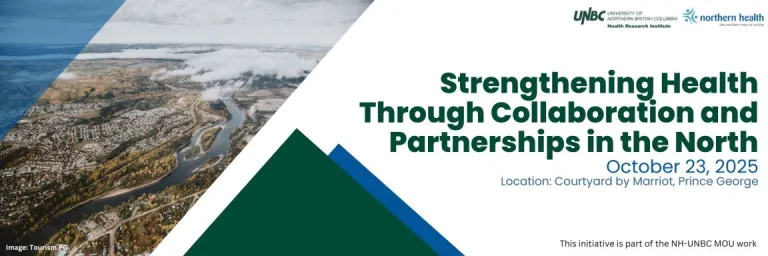
Pre-Conference Workshops
2025 Research and Quality Conference
Strengthening Health Through Collaboration and Partnerships in the North
Date: October 22nd, 2025
The Introduction to Quality Improvement
Facilitator: Jocelyn Raymond
Location: Courtyard by Marriot (Room to be confirmed)
Time: 9:00am - 11:00am
Abstract: The Introduction to Quality Improvement Workshop covers the importance of Quality Improvement in healthcare; the important role of culture in quality improvement; the differences between quality assurance, research and quality improvement; the foundations of quality improvement, using the model for improvement; and leading quality improvement projects.
Sustaining Impact: A Fireside Chat on the Future of Patient-Oriented Research
Facilitators: Linda Li, Davina Banner-Lukaris, Sherri Mytopher
Location: Virtual
Time: 9:00am - 11:00am
Abstract: In 2025, two patient partners shared a powerful reflection on their experiences with patient-oriented research within the BC SUPPORT Unit (1). Building on this, In our Fireside Chat this workshop brings together two people with lived experience and two academic researchers for an open and thoughtful discussion. Together they will explore the challenges, opportunities, and emerging strategies for advancing patient-oriented research and sustaining its impact across British Columbia.
Learning Objectives:
- Identify opportunities and promising practices for fostering meaningful collaboration between people with lived experience and researchers
- Reflect on Astrategies for sustaining the impact of patient engagement in research activities
- Apply insights from shared experiences to enhance their own approaches to patient-oriented research
UNBC Health Research Institute Poster Session Workshop: Enhancing Professional Training Opportunities for Health Research Students in Prince George
Facilitators: Jakob Ostberg, Nuziha Thasneem Shakkir, Jonathan Doyon
Location: UNBC Bentley Centre
Time: 9:30am - 12pm
Abstract: Developing skills in professional communication and networking is essential for early-career researchers to expand their professional networks and to gain feedback on their research design and outputs. However, professional training opportunities are limited in Northern and rural communities by geographical isolation from urban academic centers, decreased capacity and resources for training opportunities, and increased costs associated with travel to larger research centers. Therefore, providing opportunities for professional development in Northern communities such as Prince George is crucial in providing equitable education and workforce preparedness for students studying in these regions.
It Takes a Village to Say Goodbye
Facilitator: Dr. Greg Andreas
Location: UNBC, Bentley Centre
Time: 1:30pm - 3:00pm
Abstract: Our current practice focuses on pathology. To try and fix something... and yet we often can't. And patients don't want to engage in talking about death at the end of a sickness. Hence, our Provincial and National data shows over 60% of us are only going to be told we are soon to die when we are almost dead, and in acute care. This is wasteful of valuable time for someone living their last chapters of life, as well as caregivers, families and heavy on healthcare resources and our system. A sad situation for all. What changes when we walk beside the person living with increasing frailty of any cause? When we ask with humility, listen and learn. Learning from and with someone. About strengths, fears, and hopes. I will share and demonstrate how curiosity for What Matters To You (WMTY) can open up a very different dynamic that supports people caring for and about people. Each other. This is possible using elements of the Serious Illness Conversation Guide as well as the GROW model on a foundation of curiosity and listening skills.
Engaging Northern Community Members to Co-Design AI in Health: Introducing the Artificial Intelligence and Technology-Enhanced Care Collaboration Centre (AiTECCC)
Facilitator: Kendall Ho
Location: Courtyard by Marriot
Time: 12:00pm - 1:30pm (bring your own lunch)
Abstract: Artificial intelligence (AI) can transform health care services, particularly in rural and remote regions in northern BC. AI could also introduce bias, perpetuate the digital divide, and compromise care. Engaging rural, remote and indigenous community members in co-designing and co-evaluating AI will help ensure rural and remote communities’ needs are prioritized.
Empowering Change: Quality Improvement Tools & Data for Smarter Systems
Facilitator: Irindu Liyanage
Location: Courtyard by Marriot
Time: 2:00pm - 4:00pm
Abstract: The "Empowering Change: Quality Improvement Tools & Data for Smarter Systems" workshop provided participants with hands-on experience in applying key quality improvement methods in real-world settings. Designed for a broad audience, this full-day session introduced essential tools such as the 5 Whys, fishbone diagrams, Pareto charts, run charts, histograms, and process mapping to support problem-solving and systems thinking.
-
Apply common QI tools to real-world challenges
-
Build a simple data collection and measurement plan
-
Understand variation in performance data
-
Use visual methods to monitor and guide improvement
-
Engage others in data-informed decision-making
Providing Safe and Gender Affirming Health Care
Facilitators: Heather Paddison, Lyric Paddison
Location: To be confirmed
Time: To be confirmed
Abstract: In this 2-hour hands-on workshop, we will do some empathy building, story sharing, education, and provide safe space for frank question and answer exchange with our patient partner to improve understanding and empower participants to improve patient care in their work.
-
Better understand the trans patient experience and define trans specific needs.
-
Understand queer specific terminology.
-
Consider recommendations to improve trans patient care.
-
Apply this understanding to building alliances and improving safety and care in their day-to-day practice.